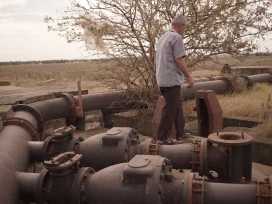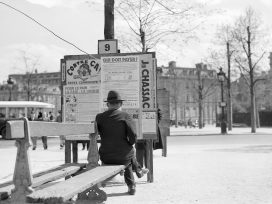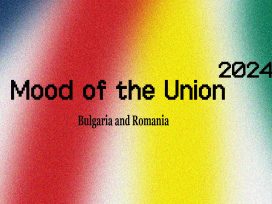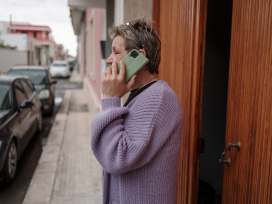What would you say about a law that gives a private company the right to expropriate citizens and asks central and local authorities to ignore all court rulings over a specific matter, no matter from which national court they come from?
It’s problematic, or at least weird, you might say.
Yet we do have such a law on the Parliament’s agenda in Romania today – Romania, one of the 28 EU member states. It is not a law from the times of Ceausescu’s dictatorship, but a law our government proposed at the end of August 2013, to be voted by the Parliament as soon as possible (most likely September).
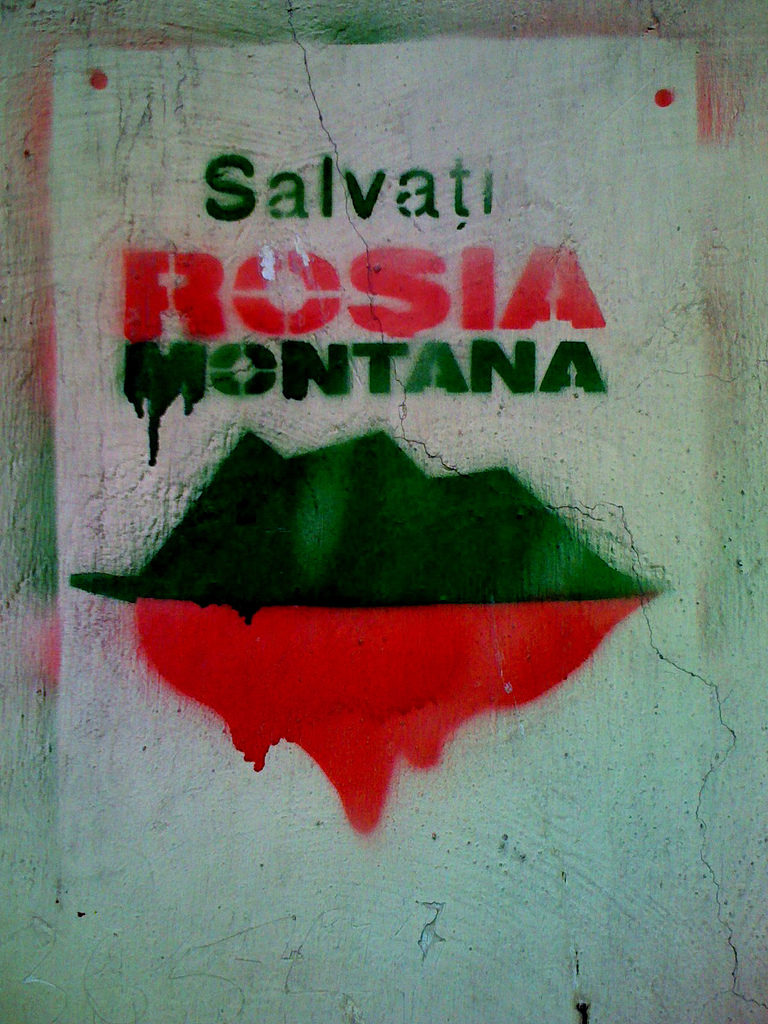
Photo: Romi Chiorean. Source: Flickr
The law concerns mining for gold and silver at Rosia Montana in the Apuseni Mountains (the western part of the Romanian Carpathians). But first, a bit of context.
For fifteen years, Rosia Montana Gold Corporation, in which Canadian mining group Gabriel Resources is the majority stakeholder, has been preparing to start digging for the 300 tonnes of gold and 1500 tonnes of silver estimated to be in the area. This is supposed to become Europe’s biggest gold mine.
As envisaged by the company, the mining would involve digging out the valley in which the Rosia Montana village lies and destroying four nearby mountains. A giant cyanide pool, where gold would be separated from ore, would be built over a nearby village.
In theory, despite the very serious environmental risks posed by such a large scale exploitation using cyanide, this should have been an easy case for Gold Corporation: post-socialist countries have been offering themselves on a plate to foreign investors over the past two decades; in line with that, successive Romanian governments, regardless of political colour, have been singing the praises of Gold Corporation and their plans for Rosia.
But something did not work quite as predicted.
Rosia Montana has been a mining town since Romania was actually Roman. Before the socialist period, villagers were going into the mines themselves to search for gold, which they then sold to banks. Even today, they feel a sense of ownership over the precious resources hidden underground.
This region in the Apuseni Mountains is extraordinary for its rich biodiversity. With mining now halted, many people live off the land and from raising animals. Old people from Rosia say that no gold in the world can buy the peace the neighbouring mountains offer them.
On top of that, there is local pride for the cultural value of the houses, churches and ancient mining galleries the village and nearby areas host. Rosia Montana is the oldest documented Romanian locality and has been considered for inclusion on the UNESCO World Heritage list for its cultural and natural riches.
So when Gold Corporation began the process of buying up properties in the village (which it started doing in tandem to applying for necessary construction and exploitation permits), not everyone in the 3,000 strong village was happy.
When I visited Rosia in 2007, the community was already deeply divided: hundreds of houses had already been purchased by Gold, but hundreds of others had signs which said “This property is NOT for sale.” There was suspicion among the two groups, those who chose to take company compensation and leave and those who chose to stay.
The opponents of the project had a clear case, to which they have stuck until now: their homes lie on the territory of the planned quarry; if they do not move – and many said they would not move unless dead – the mine would not exist.
This has held true for fifteen years, despite increasing pressure on the villagers to pack up and sell. Even six years ago, the old Hungarian woman who hosted me was speaking of threatening calls she received which were meant to get her to move away from Rosia. Today, villagers complain that the company has even created a “private militia” of sorts which intimidates them.
Many of these episodes of harassment have been documented, but the most recent example has been filmed on the occasion of the visit of Romanian Parliamentarians from the UNESCO Commission to Rosia (August 2013): you can see the company’s private security corps working side by side with the police to clear public streets of opponents of the project.
Over this decade and a half, it is fair to say that the Campaign to Save Rosia Montana has grown into a social movement of country-wide proportions. And this is an extraordinary claim to make for a post-socialist country where social activism is weak, where people are only now starting to acquaint themselves to the idea that the public space belongs to them.
At first supported by environmentalists and architects interested in the preservation of the cultural heritage of Rosia, the campaign gradually garnered the sympathy of much of the larger public in Romania.
Crucial in making the opposition so strong have been the tactics of Gold Corporation, who are believed to have bought off politicians and the media.
Over the years, Romanian media has been systematically promoting the company message, while blocking out the opposition; merely isolated voices in newspapers or bloggers covered criticisms to the project. In 2010, a public scandal broke out when it was revealed that twenty of the country’s better known journalists and analysts had been flown off to New Zealand – at Gold’s expense – on a fact finding mission. This is common practice among journalists to be fair, but one which nevertheless resulted in overwhelmingly positive coverage for the company.
I have personally seen internal email communication by Gold employees describing their lobby practices to reach various embassies and even EU actors. Again, not an uncommon practice among companies, but one which has never been publicly exposed and properly discussed in Romania for fear of legal reprisals by a rich corporation. People have a sense that politicians have been corrupted and the politicians’ uncritical support for the project does little to alleviate such suspicions.
For more than ten years, most of the media and most of the political class have emphasized the benefits of the project: mostly job creation and money for the state coffers. According to the latest agreement between the Romanian state and Gold, published together with the draft law mentioned at the start of this article, our government expects Gold to create 2,300 jobs during the mine construction period (2014-2016, as envisaged by the agreement) and 900 during the exploitation period (seventeen years starting from 2016). The same document estimates direct financial benefits for the Romanian budget at 2.3 billion US dollars.
These are, of course, wishful estimates. Even so, for a sense of measure: the profit for Romania roughly equals the amount of money spent by mayors of Bucharest during twelve years just for flowers in the city and the number of jobs is just three times more than the number of jobs created only last month by a German automotive company in the city of Baia Mare (estimates based on numbers offered by urban planning activist Nicusor Dan in his blog).
Nevertheless, the message of profits and jobs has been carrying some weight in the public space.
All the while though, regardless of the cost-benefit equation for this project, the company has for the past fifteen years been unable to obtain all the necessary permits to start the construction and exploration. Construction permits granted by local authorities have been struck down in courts, reissued, and struck down again in appeals courts. The same has been the case with urban plans, permits for deforestation, permits to destroy buildings of cultural heritage and others. Perhaps the crown piece in the permitting puzzle, the environmental permit, has been sitting since 2004 with the Ministry of Environment.
And this is the context in which the law I started my text from appears: a company tries for fifteen years to start a gold mine but cannot either get permits nor get rid of the people who have property on the mine’s perimeter. So the sympathetic government of Socialist Prime Minister Victor Ponta finally finds a solution.
A law which first of all declares that the Rosia Montana project is of national interest – hardly an uncontroversial claim – and then goes on to describe how locals will be expropriated from the territory of the future mine, a perimeter for which a concession is being granted to Gold for 49 years, and which also allows for expropriations to be conducted directly by the private company.
A law which then mandates various central and local authorities to grant the permits needed by the company regardless of the stages of litigation in courts, and regardless of internal institutional procedures (instead, the permits have to be issued by certain terms stated in the text of the law: 15 days, 30 days, 60 days). A law which leaves no place for the citizens to have a say.
But a law to which Romanian citizens have reacted strongly. On 1 September, a day of mobilization was called for and in over twenty cities in Romania and twenty others abroad, people have gathered to protest a law which they took as a slap in the face from their own government.
“Revolutia incepe la Rosia Montana” (“The Revolution Begins with Rosia Montana”) has been the slogan of these protests, gathering thousands in some locations and set to continue over the next days in some places. Massive social media support has accompanied the street actions, while many of the major newspapers and TV stations have kept quiet about the protests or counted participation in hundreds.
Romania has seen little public mobilization after the early 1990s. But something cracked in January 2012, when tens of thousands took to the streets in several cities, for days at a time, to protest, primarily, at the poor state of the medical system. These snowballed into massive protests against an inefficient political system that did not represent them. They also protested at the time against the Rosia Montana project.
Just like the Occupy movement, those protests were said to bring little in terms of concrete effects. I was sure then about the Romanian protests, as about the Occupy movement, that their great value lies in teaching people street activism, in giving all of us a taste of how we can use the public space, how together we can build communities and have a voice.
We have seen this happening in so many places around the world over the past years that it is hard to count. And today on the streets of Romania we are seeing the seeds of those experiences.
